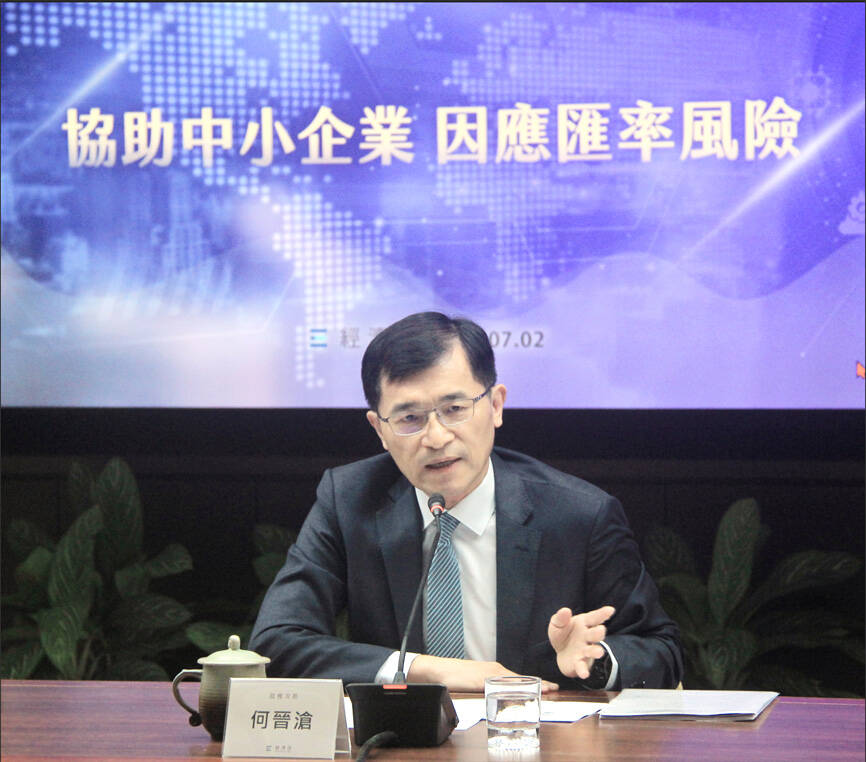The Ministry of Economic Affairs would continue to offer the nation’s small and medium-sized enterprises (SMEs) financial assistance, and encourage the use of hedging tools against foreign exchange volatility, as the sharp appreciation of the New Taiwan dollar since early May has seriously affected their operations, Deputy Minister of Economic Affairs Ho Chin-tsang (何晉滄) said yesterday.
There are 46,000 export-oriented SMEs in Taiwan, most of which are in the manufacturing industry, and 80 percent of them quote prices in US dollars, Ho said at a news conference in Taipei.
As SMEs are highly vulnerable to exchange rate fluctuations, the ministry would step up promotion of three hedging tools, including foreign exchange forward contracts, foreign exchange options and natural hedging, while helping them connect with banks to explore alternative hedging instruments, he said.

Photo courtesy of the Ministry of Economic Affairs
Firms most affected by the sharp appreciation of the NT dollar are those in the metal, machine tools, machinery, textiles, plastics and rubber, auto parts, food, electronic components, and information and communications industries, he said.
The ministry has set up a foreign exchange response team, which is expected to run for at least three months to offer SMEs clear countermeasures, accessible consultation and practical tools they can use when needed, Small and Medium Enterprise Startup Administration Director-General Lee Guann-jyh (李冠志) said.
The team is mainly composed of personnel from the administration, the Industrial Development and International Trade administrations, Lee said.
The ministry earlier yesterday held a meeting with eight state-run banks — Bank of Taiwan Co (臺灣銀行), Land Bank of Taiwan Co (土地銀行), Taiwan Cooperative Bank Ltd (合作金庫), First Commercial Bank Co (第一銀行), Hua Nan Commercial Bank Ltd (華南銀行), Chang Hwa Commercial Bank Ltd (彰化銀行), Mega International Commercial Bank Co (兆豐銀行) and Taiwan Business Bank Co (台灣企銀) — to discuss how to assist SMEs.
The ministry would continue talks with the banks on further lowering fees for SMEs applying for financial aid, it said.
In April, the ministry announced it would offer up to NT$6 billion (US$206.8 million) in loan guarantees for SMEs directly affected by US tariffs, and an additional NT$5 billion for those indirectly affected.
Each SME could receive up to NT$60 million in guarantees and large firms could qualify for up to NT$100 million, while firms with fewer than 30 employees could receive loan guarantees of up to NT$35 million, it said.
The Small and Medium Enterprise Credit Guarantee Fund of Taiwan (信保基金) provided about NT$159 billion in loan guarantees to small, medium and micro-sized enterprises last month, up 7.8 percent from NT$147.5 billion in May, a fund official told the Taipei Times by telephone.
That represented a 5 percent increase to NT$829.4 billion in the first half of this year, up from NT$790.2 billion a year earlier, the official said on condition of anonymity.

In Italy’s storied gold-making hubs, jewelers are reworking their designs to trim gold content as they race to blunt the effect of record prices and appeal to shoppers watching their budgets. Gold prices hit a record high on Thursday, surging near US$5,600 an ounce, more than double a year ago as geopolitical concerns and jitters over trade pushed investors toward the safe-haven asset. The rally is putting undue pressure on small artisans as they face mounting demands from customers, including international brands, to produce cheaper items, from signature pieces to wedding rings, according to interviews with four independent jewelers in Italy’s main

Japanese Prime Minister Sanae Takaichi has talked up the benefits of a weaker yen in a campaign speech, adopting a tone at odds with her finance ministry, which has refused to rule out any options to counter excessive foreign exchange volatility. Takaichi later softened her stance, saying she did not have a preference for the yen’s direction. “People say the weak yen is bad right now, but for export industries, it’s a major opportunity,” Takaichi said on Saturday at a rally for Liberal Democratic Party candidate Daishiro Yamagiwa in Kanagawa Prefecture ahead of a snap election on Sunday. “Whether it’s selling food or

CONCERNS: Tech companies investing in AI businesses that purchase their products have raised questions among investors that they are artificially propping up demand Nvidia Corp chief executive officer Jensen Huang (黃仁勳) on Saturday said that the company would be participating in OpenAI’s latest funding round, describing it as potentially “the largest investment we’ve ever made.” “We will invest a great deal of money,” Huang told reporters while visiting Taipei. “I believe in OpenAI. The work that they do is incredible. They’re one of the most consequential companies of our time.” Huang did not say exactly how much Nvidia might contribute, but described the investment as “huge.” “Let Sam announce how much he’s going to raise — it’s for him to decide,” Huang said, referring to OpenAI

The global server market is expected to grow 12.8 percent annually this year, with artificial intelligence (AI) servers projected to account for 16.5 percent, driven by continued investment in AI infrastructure by major cloud service providers (CSPs), market researcher TrendForce Corp (集邦科技) said yesterday. Global AI server shipments this year are expected to increase 28 percent year-on-year to more than 2.7 million units, driven by sustained demand from CSPs and government sovereign cloud projects, TrendForce analyst Frank Kung (龔明德) told the Taipei Times. Demand for GPU-based AI servers, including Nvidia Corp’s GB and Vera Rubin rack systems, is expected to remain high,